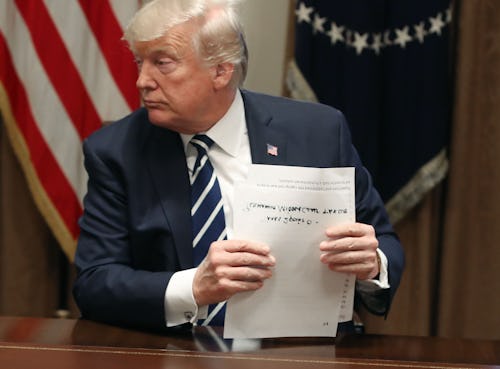
One of the strange byproducts of having a former president who not only engaged in, but actually celebrated his rampant criminality is that suddenly the general public becomes extremely aware of a whole suite of otherwise relatively obscure laws and statutes. Outside of professionals and legal wonks, you’d likely have been hard-pressed to find anyone who knew about things like the Hatch Act — much less cared about it — before Donald Trump and his cronies flouted that law with such gleeful abandon that people couldn’t help but take notice.
So too has it been with the Presidential Records Act, the 1978 law that regulates where and how all of a former president’s documents are kept, and by whom. The act, created by Congress to prevent former President Richard Nixon from obscuring his role in the Watergate scandal, essentially mandates that presidents and vice presidents keep all their official documents until their term in office is over, at which point those records belong to the government, by way of the National Archive.
That, at least, is how the law is supposed to work. But when you’re Donald Trump, “laws” and “supposed to work” are less an ironclad absolute and more of a friendly suggestion to be waved off in a fit of ego-driven megalomania.
This is why, evidently, officials from the National Archives were forced to retrieve boxes of presidential documents from Trump’s Mar-a-Lago resort in Florida last month, after he’d evidently absconded the White House with them last year. What’s more, according to multiple sources who spoke with The Washington Post on Monday, the documents in question weren’t just random doodles, scribbled on a White House-embossed cocktail napkin. Instead they consisted of “mementos, gifts, letters from world leaders and other correspondence” including the infamous “love letters” between Trump and North Korean dictator Kim Jong Un. This, from a man who based the entirety of his first campaign for president on locking up someone who improperly stored her government documents.
Incredibly, running off with boxes full of important documents is perhaps the best-case scenario for Trump, given that he also has a penchant for just destroying his paperwork entirely — as was the case of multiple pages that required being taped back together after he was forced to turn them over to the congressional committee investigating the events of, and leading up to, the Capitol insurrection. And while the Post notes that every administration inevitably runs afoul of the PRA at some point, the sheer scale of the Trump White House’s document destruction — and Trump’s personal commitment to the task — sets it apart by orders of magnitude from its predecessors.
“I don’t think he did this out of malicious intent to avoid complying with the Presidential Records Act,” one former Trump administration official told the Post. “As long as he’s been in business, he’s been very transactional, and it was probably his longtime practice and I don’t think his habits changed when he got to the White House.”
In other words, he wasn’t trying to break the law ... he just didn’t care if he did. Sounds about right.







